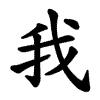我
- I, me;
- first-person pronoun;
Etymology
Originally a pictograph of a farming or battle tool resembling a trident.
Early forms (oracle bone, bronze inscriptions): depicted a tool with protruding spikes.
Later (clerical script): reshaped to resemble 手 (hand) + 戈 (spear), giving a false impression of a compound.
Semantic shift: borrowed phonetically to mean “I, me.”
Evolution:
Shang–Western Zhou: used as “we” (1st-person plural).
Warring States–Han: meaning narrowed to generic first-person singular.
Usage in Korean
我國 (아국) – our country
我軍 (아군) – our army; friendly forces
自我 (자아) – self, ego
Additional notes
In Buddhist and philosophical texts: 我 (아) refers to the “self” as the independent, eternal subject — contrasted with 非我 (비아, “not-self”).
